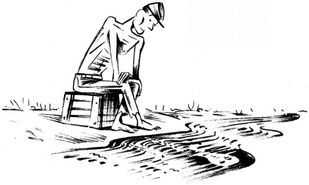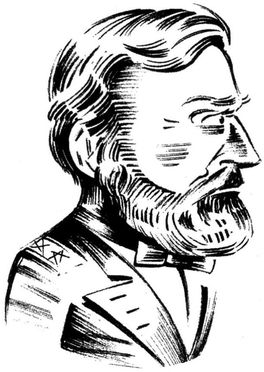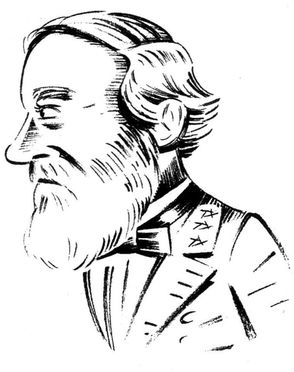Two Miserable Presidents (18 page)
Read Two Miserable Presidents Online
Authors: Steve Sheinkin

R
osecrans had been a pretty good general so far, but now he seemed unable to recover from the shock of Chickamauga. As Abraham Lincoln put it, Rosecrans appeared “confused and stunned like a duck hit on the head.” Since this was not a quality Lincoln was looking for his military leaders, he sent in a general he trusted more: Ulysses S. Grant. By late November, Grant was ready to attack. And his attack worked, though not quite according to plan.
osecrans had been a pretty good general so far, but now he seemed unable to recover from the shock of Chickamauga. As Abraham Lincoln put it, Rosecrans appeared “confused and stunned like a duck hit on the head.” Since this was not a quality Lincoln was looking for his military leaders, he sent in a general he trusted more: Ulysses S. Grant. By late November, Grant was ready to attack. And his attack worked, though not quite according to plan.
Part of Grant's plan at the battle of Chattanooga was to have some of his soldiers march to the bottom of a steep hill called Missionary Ridge. But they were not supposed to charge up the hillâthere were way too many Confederate soldiers and guns up there.
Chomping on a cigar, Grant watched the action through binoculars from a nearby hilltop. He saw Union troops fight their way to the base of Missionary Ridge. Then he saw something alarming: the soldiers were charging up the hill! Grant turned angrily to the generals George Thomas and Gordon Granger:
Grant:
Thomas, who ordered those men up the ridge?
Thomas, who ordered those men up the ridge?
Thomas:
I don't know. I did not. Did you order them up, Granger?
I don't know. I did not. Did you order them up, Granger?
Granger:
No, they started up without orders. When those fellows get started all *#$%! can't stop them.
No, they started up without orders. When those fellows get started all *#$%! can't stop them.
Grant bit down on his cigar. “Someone will suffer for it,” he muttered, “if it turns out badly.”
This was a perfect example of how little control generals had over Civil War battles. Once the shooting started, they really had no idea what was going to happen. At Chattanooga, Grant got lucky. Union soldiers swept up Missionary Ridge, driving off General Bragg's Confederate forces and charging their way to a huge Union victory.
Southerners, who had been so happy after Chickamauga, were now depressed again. In Richmond, John Jones noted that the bad news put his children in a kind of daze. “Bragg's disaster so shocked my son Custis,” he said, “that, at dinner, when asked for rice, he poured water into his sister's plate.”
An even more significant effect of this battle was that Abraham Lincoln decided to put Grant in charge of the entire Union army. Grant set off for Washington to make plans with Lincoln. And to meet himâthe Union's two most important leaders had never seen each other in person.
N
ot all Union soldiers were as lucky as General Grant. John Ransom, a twenty-year-old soldier from Michigan, was taken prisoner during the fighting in Tennessee. He was shipped to Georgia, where he found himself in Andersonvilleâthe most dreaded prisoner of war camp in the South.
ot all Union soldiers were as lucky as General Grant. John Ransom, a twenty-year-old soldier from Michigan, was taken prisoner during the fighting in Tennessee. He was shipped to Georgia, where he found himself in Andersonvilleâthe most dreaded prisoner of war camp in the South.
Andersonville was simply a large open field surrounded by wooden walls, designed to hold 10,000 prisoners. But by the summer of 1864, more than 30,000 Union soldiers were crowded into the camp. With no place to hide from the sizzling sun, prisoners baked in the filthy open field.
“My heart aches for the poor wretches, Yankees though they are,” said a Georgia woman named Eliza Andrews.
The entire South was short of food, so Union prisoners suffered from hunger along with everyone else. And at Andersonville the only water for drinking and bathing (and using as a toilet) was a thin stream winding though the open field. Ransom wrote in his diary:
“Nothing can be worse or nastier than the stream drizzling its way through this camp ⦠. Dead bodies lay around all. day in the broiling sun, by the dozen and even hundreds ⦠It's too horrible for me to describe in fitting language.”
John Ransom

Disease and hunger killed quickly in Andersonvilleâan average of nearly thirty prisoners died every day. Ransom wrote in his diary that it was taking every ounce of energy and willpower he had just to stay alive: “Could die in two hours if I wanted to, but don't.”
Meanwhile, Southern prisoners were just as miserable in Northern prison camps. A Tennessee soldier named Marcus Toney shivered through a bitter winter at the Elmira prison camp in New York. Even as temperatures dropped to twenty degrees below zero, prisoners were not given enough warm clothing or blankets. In a hopeless attempt to get warm, four men crowded into each wooden bunk. Everyone had to sleep on his side, Toney remembered, and no one
could move on his own: “When ready to change positions, one would call out, âAll turn to the right'; and the next call would be, âAll turn to the left.' The turns had to be made as stated, or there would be collisions.”
could move on his own: “When ready to change positions, one would call out, âAll turn to the right'; and the next call would be, âAll turn to the left.' The turns had to be made as stated, or there would be collisions.”
A group of Alabama prisoners decided to bust out of Elmira the only way possibleâby going underground. Beginning inside their tent, they dug down six feet, then started tunneling toward the prison walls, sixty-eight feet away.
“We thought we could dig our way out in four or five days,” John Maull remembered, “but soon discovered it was no easy task.”
Knowing that the prison guards would hear any shoveling noises, they dug silently with pocketknivesâthat slowed things down a bit. Then they ran into two problems that have faced everyone who has ever tried to dig an escape tunnel. First, the lack of oxygen in the narrow tunnel gave them dizzy spells and headaches. Second, they somehow had to get rid of all the dirt they were digging up. Their solution was to stuff the dirt into their pockets and stroll around the camp at night, scattering it casually, little by little.
After about two months of work, the diggers hit the underground base of the prison wall. The men dug a little deeper and went under the wall. Then they dug their way up, broke through the surface, and looked up at a bright moon.
“Half past three o'clock and all is well!” they heard a guard inside the camp shout.
Ten men made it out of Elmira that night. They grabbed some corn and apples from a nearby farm, then split up. Amazingly, nine of them made it safely back to the South.
But tens of thousands of soldiers were still suffering in prison camps, North and South. And they knew they would probably be stuck there until the end of the war. When would that be?
Ulysses S. Grant was thinking about that same question.
A
clerk stood behind the front desk of Willard's Hotel in Washington, D.C. It was a late afternoon in March 1864.
clerk stood behind the front desk of Willard's Hotel in Washington, D.C. It was a late afternoon in March 1864.
The clerk looked up and watched a man and a boy approach the desk. The man was wearing a sloppy and dirty military uniformâthe uniform of a general in the Union army. But so what? Generals came and went from Willard's all the time.
The man asked for a room. The clerk said he might have something, perhaps a small room on the top floor.
That would be fine, the man said.
The clerk pointed to the registration book. The man turned the book toward him and signed: “U.S. Grant and son.”
The clerk's eyes nearly popped out of his head when he read his guest's name. Suddenly becoming very respectful, he insisted that Grant take the best suite of rooms in the hotel.
After checking in, Grant and his fourteen-year-old son, Fred, went to the dining room. As usual, Grant was feeling shy and hoping no one would notice him. But other diners were looking over and whispering and pointing. Then a man sitting nearby started pounding his knife on the table. He shouted: “I have the honor to inform you that General Grant is present in the room with us!”
Everyone jumped up and started chanting: “Grant! Grant! Grant!”
Grant stood and made an awkward bow. Then he sat down and tried to finish his meal. A newspaper reporter described the general as “blushing and confused.”
How could it get worse? That evening, Grant was invited to a party at the White House. As soon as he walked into the East Room, he was mobbed by men and women in fancy evening wear. Then Grant saw a very tall man working his way through the crowdâa
man he recognized from pictures he'd seen.
man he recognized from pictures he'd seen.
“It is General Grant, is it not?” asked Abraham Lincoln.
“Yes,” Grant replied.
“I'm glad to see you, General.”
And they shook hands.
Next, Grant was paraded around the room, arm in arm with Mary Lincoln. People jumped onto chairs and tables to get a better view.
Someone shouted: “Stand up so we can all have a look at you!”
But Grant was standingâhe just wasn't that tall. So people made him step up onto a sofa. And Grant stood up there for a while, beet red and sweating rivers, and mumbling something about wanting to be “left alone.”
In a brief ceremony a couple days later, Grant was officially placed in charge of all Union forces. Lincoln asked him to stay in town for a dinner in his honor. But Grant politely declinedâat this point he just wanted to get back to the war.
“Really, Mr. Lincoln,” Grant said, “I have had enough of this show business.”
A
few weeks later, down in Richmond, Varina Davis walked from her home to her husband's office, carrying Jefferson's lunch on a tray. Jefferson Davis was just sitting down to eat when he heard a servant let loose a terrible scream.
few weeks later, down in Richmond, Varina Davis walked from her home to her husband's office, carrying Jefferson's lunch on a tray. Jefferson Davis was just sitting down to eat when he heard a servant let loose a terrible scream.
The news was awful: Jefferson and Varina's five-year-old son, Joe, had just slipped off a balcony, falling thirty feet to the brick ground below. Joe died moments later.
Davis tried to go back to work, but it was useless. He threw down the papers he was supposed to read, crying, “I must have this day with my little son!”
Like Lincoln two years before, Davis had lost a child. And like Lincoln, Davis had very little time to grieve. Another year of fighting was about to begin, and the South needed a plan.
As always, Robert E. Lee was itching to attack, and he had something to tell his officers:
“We have got to whip them! We must whip them!”
Ulysses S. Grant

Robert E. Lee

But Lee and Davis agreed that risking a major attack was not the best strategy for the South at that moment. The Union was going to have a presidential election in Novemberâand this was the key to the South's strategy. Lincoln was running for reelection, but he was looking pretty weak. People up north were sick of the endless bloodshed and were longing for peace. So it was very possible that voters might elect a new president, one who was willing to end the war by giving the South its independence.
The next six months were everything. The Confederate army had to make it through the next six months without losing any major battles. That way, when it was time for the election in November, the end of the war would still be nowhere in sight. Northern voters would blame Lincoln for thisâand they would boot him out of office.
All of this brought up an important question: Would Union war strategy change now that Grant was in charge of Union forces? Definitely, said the Confederate general James Longstreet. A college friend of Grant's (and a guest at his wedding), Longstreet had followed Grant's career closely. And he warned his fellow officers to prepare for nonstop action: “That man will fight us every day and every hour till the end of the war.”
That's exactly what Grant was planning to do.
Other books
Finding 52 by Len Norman
Day of the Dead by Maurizio de Giovanni, Antony Shugaar
Falling to Ash by Karen Mahoney
Food for Thought by Amy Lane
OPERATION: DATE ESCAPE by Brookes, Lindsey
The Christmas Puzzle (Pitkirtly Mysteries Book 8) by Cecilia Peartree
Shatterproof by Roland Smith
El gran cuaderno by Agota Kristof
The Thunder-Horse by Alyx Shaw
Jacques the Fatalist: And His Master by Denis Diderot